Steel or Aluminum Fencing: Which is the Better Choice?
To achieve the timeless appearance of a traditional wrought iron fence, homeowners are offered two practical options: Steel or Aluminum. So what is the difference between the two, and which one offers you the most advantages for your new fence? Both steel and aluminum provide a low maintenance option in comparison to traditional wrought iron or wood fencing. And while they are both a durable fencing option, choosing the right material for your fence project will ensure that you are satisfied with the outcome and that your fence will last a long time.
Steel Fencing 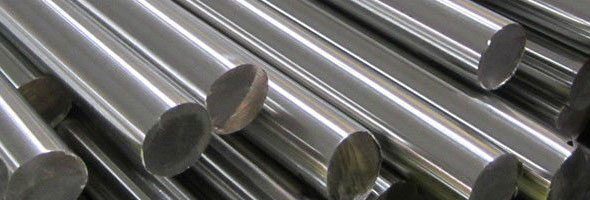
Steel fencing is notorious for its strength. It is heavy and resistant to damage, impact, and wind. Due to its weight, steel fencing may be more difficult to install than aluminum fencing, however the peace of mind from choosing a steel fence is well worth it.
Our steel fences are built with galvanized steel. The term galvanized means the steel has been coated with a protective layer of zinc to prevent 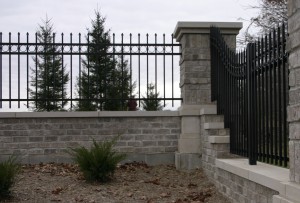 rust and corrosion. Steel fences, like aluminum, are available in a wide variety of colors and designs. They can be small, decorative fences or large security fences. Most chain link fences are made of galvanized steel, but this is not what most people envision when they think of galvanized steel. Typically, galvanized steel fences are more stylish. Many people prefer the look of steel fencing over aluminum because it closely resembles the look of a traditional wrought iron fence.
rust and corrosion. Steel fences, like aluminum, are available in a wide variety of colors and designs. They can be small, decorative fences or large security fences. Most chain link fences are made of galvanized steel, but this is not what most people envision when they think of galvanized steel. Typically, galvanized steel fences are more stylish. Many people prefer the look of steel fencing over aluminum because it closely resembles the look of a traditional wrought iron fence.
Disadvantages of Steel Fencing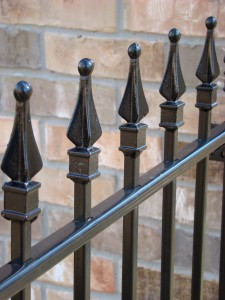
- Steel fencing is heavy and difficult to install, making it (for most people) not a do-it-yourself project.
- Though the installation cost may be cheaper for steel fencing than aluminum, the material itself is more expensive than aluminum.
Aluminum Fencing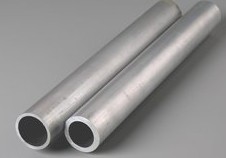
Aluminum is another popular material for ornamental metal fences. Aluminum fencing material is generally cheaper. Aluminum fencing, like steel requires very little 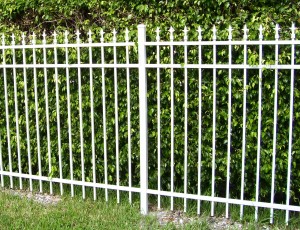 maintenance, and can be cleaned with simply a garden hose and soap. It is extremely resistant to corrosion, which gives it a big advantage over steel fencing if your home is near a large body of saltwater. It is also 100% recyclable, should you ever need to replace it.
maintenance, and can be cleaned with simply a garden hose and soap. It is extremely resistant to corrosion, which gives it a big advantage over steel fencing if your home is near a large body of saltwater. It is also 100% recyclable, should you ever need to replace it.
Disadvantages of Aluminum Fencing
- Aluminum is light-weight and easily dented, bent or damaged in storms and by kids climbing on it
- In order to be welded, Aluminum fencing requires a specialty-skilled welder.
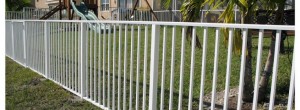
- Due to its flimsy nature, Aluminum fencing is not recommended for security purposes or commercial use.
So Which is Right For You?
Both Aluminum and Steel Fencing offer a low-maintenance alternative for fencing, and both add a visually appealing accent to the landscaping of your home. So which should you choose? If your needs are more decorative than functional, Aluminum fencing is a great option. However, if you require a fence that is more functional for long term, secure, and damage-resistant, then steel fencing is the best option for you.
I like the iron fencing pictured here. I am looking at getting a fence installed around my yard, actually. It would help keep my children safe. My wife and I have been discussing the matter for some time now.
I was actually wondering this exact this! I wasn’t sure if I should get a an steel or aluminum fence. So thank you for talking about this, and letting me know about the pro’s and con’s of both of them.
This article has really helped me understand the difference between steel and aluminum fencing. I really like what was said about steel being sturdier. I think that with all the given attributes, steel might be the better option for me. Thanks for sharing!
I think this article is very helpful for people,it has solved my problem,thanks!
Thanks for sharing all of this advice on choosing the right metal fencing material! Since I’ve been wanting to get a nice and classic metal fence for my yard, this guide is exactly what I need! We were considering an aluminum fence, but since we want it to be sturdy and last longer, we will be going with steel.
My dad wants to put up a fence around our yard, but can’t choose what material he wants it to be made out of. I don’t know anything about this kind of stuff, so I figured that I could at least help him look around for some insights that can help him out. After reading this, I think that going with the steel fencing is going to be our best option. It’s within our price range and I think it would last longer.
So I’m going to be replacing the gates around my home in a month or so. I’ve looking into both metal types and I think I’m going to go with steel. Mainly due to it’s strength and durability.
I appreciate you pointing out that aluminum fencing is cheap option. It is more flimsy then a steel fence and susceptible to dents compared to steel. I’ll have to show this to my wife and see what she has to say about it.
some genuinely wonderful information, Glad I discovered this.
After reading this comparison, it is still pretty hard to choose which material I want to use for my fencing. I only need the fence to keep my dog in, so it doesn’t need to meet any sort of security measures. I’m starting to think that steel might be the best choice for the price, especially if I can find a style that matches my house’s exterior.